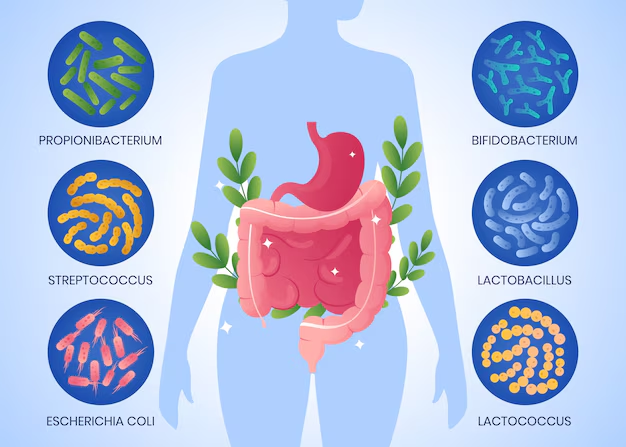Ayurvedic Approach to Digestive Health: Healing the Gut Naturally
Ayurvedic Approach to Digestive Health is at the core of Ayurvedic medicine which views the digestive system as the foundation of overall well-being. According to Ayurveda, proper digestion not only ensures the efficient processing of nutrients but also plays a crucial role in maintaining physical and mental balance.
Understanding Digestion in Ayurveda
Ayurvedic Approach to Digestive Health Healing the Gut Naturally considers digestion a complex process influenced by several factors, including diet, lifestyle, emotions, and the strength of the digestive fire (agni). Digestive fire is central to Ayurvedic understanding—it’s responsible for breaking down food, absorbing nutrients, and eliminating waste
Signs of Imbalanced Digestion According to Ayurveda
Identifying signs of imbalanced digestion is crucial in Ayurveda to prevent further health issues. Common symptoms of poor digestion include:
- Indigestion: Feeling heavy or bloated after meals.
- Gas and bloating: Excessive gas or bloating after eating.
- Constipation or diarrhea: Irregular bowel movements.
- Bad breath: A sign of toxins (ama) accumulating in the digestive tract.
- Fatigue: Difficulty in absorbing nutrients leading to low energy levels.
Factors Contributing to Digestive Imbalance
Several factors can contribute to digestive imbalance according to Ayurveda:
- Dietary Choices: Consuming incompatible foods (virudha ahara), excessive cold or raw foods, or overeating.
- Lifestyle: Irregular eating habits, eating under stress, lack of physical activity, and inadequate rest.
- Emotional State: Stress, anxiety, and emotional disturbances can weaken digestive fire.
- Seasonal Changes: Different seasons affect digestion differently; adjusting diet and lifestyle accordingly is crucial.
Healing the Gut Naturally with Ayurveda

Ayurveda offers a holistic approach to healing the gut, focusing on restoring balance to agni and supporting digestive function naturally. Here are some key principles and practices:
1. Balancing Agni with Proper Diet
Ayurvedic Approach to Digestive Health Healing the Gut Naturally emphasizes the importance of eating according to one’s constitution (prakriti) and current state of dosha imbalance (vikriti). General dietary guidelines for maintaining strong agni include:
- Warm, cooked foods: Easier to digest and promote agni without taxing the digestive system.
- Avoiding incompatible food combinations: Such as mixing dairy with fruit or combining certain proteins with carbohydrates.
- Emphasizing digestive spices: Including ginger, cumin, coriander, turmeric, and fennel to enhance digestion and reduce ama.
- Moderating intake: Eating to about 75% of capacity to leave room for digestion.
2. Herbal Support for Digestion
Ayurvedic herbs play a significant role in supporting digestive health. Some commonly used herbs include:
- Triphala: A combination of three fruits (amla, bibhitaki, haritaki) known for cleansing the digestive tract and promoting regular bowel movements.
- Ginger: Stimulates agni, reduces gas and bloating, and improves digestion.
- Aloe vera: Soothes and heals the digestive tract, useful in cases of inflammation or acidity.
- Peppermint: Relieves indigestion, gas, and bloating.
3. Detoxification (Panchakarma) Therapies
For more intensive healing, Ayurveda recommends Panchakarma therapies. These cleansing treatments help remove toxins (ama) from the body, rejuvenate agni, and restore balance to the digestive system. Panchakarma treatments may include:
- Abhyanga: Ayurvedic oil massage to pacify Vata and improve circulation.
- Swedana: Herbal steam therapy to open pores, eliminate toxins, and relax the body.
- Basti: Enema therapy to cleanse and nourish the colon, particularly beneficial for Vata-related digestive disorders.
4. Lifestyle Recommendations
Beyond diet and herbs, Ayurveda emphasizes lifestyle practices that support digestive health:
- Eating mindfully: Avoiding distractions and eating in a calm environment.
- Establishing routine: Eating meals at consistent times each day to regulate agni.
- Staying hydrated: Drinking warm water throughout the day to support digestion and flush toxins.
- Managing stress: Practicing yoga, meditation, and deep breathing exercises to reduce stress and enhance overall well-being. Ayurveda offers a comprehensive and holistic approach to digestive health, focusing on strengthening agni, balancing doshas, and supporting the body’s natural healing processes. By incorporating Ayurvedic dietary principles, herbal remedies, detoxification therapies, and lifestyle recommendations, individuals can effectively heal and maintain optimal digestive function.









Leave a reply